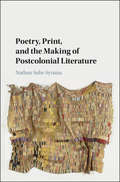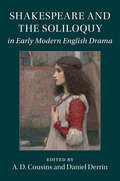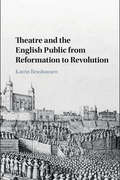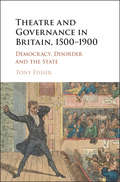- Table View
- List View
Celebrating Shakespeare
by Calvo, Clara and Kahn, Coppélia Clara Calvo Coppélia KahnOn the 400th anniversary of Shakespeare's death, this collection opens up the social practices of commemoration to new research and analysis. An international team of leading scholars explores a broad spectrum of celebrations, showing how key events - such as the Easter Rising in Ireland, the Second Vatican Council of 1964 and the Great Exhibition of 1851 - drew on Shakespeare to express political agendas. In the USA, commemoration in 1864 counted on him to symbolise unity transcending the Civil War, while the First World War pulled the 1916 anniversary celebration into the war effort, enlisting Shakespeare as patriotic poet. The essays also consider how the dream of Shakespeare as a rural poet took shape in gardens, how cartoons challenged the poet's élite status and how statues of him mutated into advertisements for gin and Disney cartoons. Richly varied illustrations supplement these case studies of the diverse, complex and contradictory aims of memorialising Shakespeare.
A History of Japanese Theatre
by Jonah SalzJapan boasts one of the world's oldest, most vibrant and most influential performance traditions. This accessible and complete history provides a comprehensive overview of Japanese theatre and its continuing global influence. Written by eminent international scholars, it spans the full range of dance-theatre genres over the past fifteen hundred years, including noh theatre, bunraku puppet theatre, kabuki theatre, shingeki modern theatre, rakugo storytelling, vanguard butoh dance and media experimentation. The first part addresses traditional genres, their historical trajectories and performance conventions. Part II covers the spectrum of new genres since Meiji (1868–), and Parts III to VI provide discussions of playwriting, architecture, Shakespeare, and interculturalism, situating Japanese elements within their global theatrical context. Beautifully illustrated with photographs and prints, this history features interviews with key modern directors, an overview of historical scholarship in English and Japanese, and a timeline. A further reading list covers a range of multimedia resources to encourage further explorations.
Cambridge Introductions to…: The Cambridge Introduction to Theatre and Literature of the Absurd
by Michael Y. BennettMichael Y. Bennett's accessible Introduction explains the complex, multidimensional nature of the works and writers associated with the absurd - a label placed upon a number of writers who revolted against traditional theatre and literature in both similar and widely different ways. Setting the movement in its historical, intellectual and cultural contexts, Bennett provides an in-depth overview of absurdism and its key figures in theatre and literature, from Samuel Beckett and Harold Pinter to Tom Stoppard. Chapters reveal the movement's origins, development and present-day influence upon popular culture around the world, employing the latest research to this often challenging area of study in a balanced and authoritative approach. Essential reading for students of literature and theatre, this book provides the necessary tools to interpret and develop the study of a movement associated with some of the twentieth century's greatest and most influential cultural figures.
Shakespeare and the Natural World
by Tom MacfaulExploring the rich range of meanings that Shakespeare finds in the natural world, this book fuses ecocritical approaches to Renaissance literature with recent thinking about the significance of religion in Shakespeare's plays. MacFaul offers a clear introduction to some of the key problems in Renaissance natural philosophy and their relationship to Reformation theology, with individual chapters focusing on the role of animals in Shakespeare's universe, the representation of rural life, and the way in which humans' consumption of natural materials transforms their destinies. These discussions enable powerful new readings of Shakespeare's plays, including A Midsummer Night's Dream, As You Like It, King Lear, Macbeth, The Tempest, The Winter's Tale, and the history plays. Proposing that Shakespeare's representation of the relationship between man and nature anticipated that of the Romantics, this volume will interest scholars of Shakespeare studies, Renaissance drama and literature, and ecocritical studies of Shakespeare.
French Visual Culture and the Making of Medieval Theater
by Laura WeigertThis book revives what was unique, strange and exciting about the variety of performances that took place in the realms of the French kings and Burgundian dukes. Laura Weigert brings together a wealth of visual artifacts and practices to explore this tradition of late medieval performance located not in 'theaters' but in churches, courts, and city streets and squares. By stressing the theatricality rather than the realism of fifteenth-century visual culture and the spectacular rather than the devotional nature of its effects, she offers a new way of thinking about late medieval representation and spectatorship. She shows how images that ostensibly document medieval performance instead revise its characteristic features to conform to a playgoing experience that was associated with classical antiquity. This retrospective vision of the late medieval performance tradition contributed to its demise in sixteenth-century France and promoted assumptions about medieval theater that continue to inform the contemporary disciplines of art and theater history.
Monuments and Literary Posterity in Early Modern Drama
by Brian ChalkIn spite of the ephemeral nature of performed drama, playwrights such as Marlowe, Jonson, Webster, Fletcher, and Shakespeare were deeply interested in the endurance of their theatrical work and in their own literary immortality. This book re-evaluates the relationship between these early modern dramatists and literary posterity by considering their work within the context of post-Reformation memorialization. Providing fresh analyses of plays by major dramatists, Brian Chalk considers how they depicted monuments and other funeral properties on stage in order to exploit and criticize the rich ambiguities of commemorative rituals. The book also discusses the print history of the plays featured. The subject will attract scholars and upper-level students of Renaissance drama, memory studies, early modern theatre, and print history.
Writing the Monarch in Jacobean England
by Jane RickardKing James VI and I's extensive publications and the responses they met played a key role in the literary culture of Jacobean England. This book is the first sustained study of how James's subjects commented upon, appropriated and reworked these royal writings. Jane Rickard highlights the vitality of such responses across genres - including poetry, court masque, sermon, polemic and drama - and in the different media of performance, manuscript and print. The book focuses in particular on Jonson, Donne and Shakespeare, arguing that these major authors responded in illuminatingly contrasting ways to James's claims as an author-king, made especially creative uses of the opportunities that his publications afforded and helped to inspire some of what the King in turn wrote. Their literary responses reveal that royal writing enabled a significant reimagining of the relationship between ruler and ruled. This volume will interest researchers and advanced students of Renaissance literature and history.
The Drama of Memory in Shakespeare’s History Plays
by Isabel KarremannThis book analyses the drama of memory in Shakespeare's history plays. Situating the plays in relation to the extra-dramatic contexts of early modern print culture, the Reformation and an emergent sense of nationhood, it examines the dramatic devices the theatre developed to engage with the memory crisis triggered by these historical developments. Against the established view that the theatre was a cultural site that served primarily to salvage memories, Isabel Karremann also considers the uses and functions of forgetting on the Shakespearean stage and in early modern culture. Drawing on recent developments in memory studies, new formalism and performance studies, the volume develops an innovative vocabulary and methodology for analysing Shakespeare's mnemonic dramaturgy in terms of the performance of memory that results in innovative readings of the English history plays. Karremann's book is of interest to researchers and upper-level students of Shakespeare studies, early modern drama and memory studies.
George Bernard Shaw in Context
by Brad KentWhen Shaw died in 1950, the world lost one of its most well-known authors, a revolutionary who was as renowned for his personality as he was for his humour, humanity, and rebellious thinking. He remains a compelling figure who deserves attention not only for how influential he was in his time, but for how relevant he is to ours. This collection sets Shaw's life and achievements in context, with 42 scholarly essays devoted to subjects that interested him and defined his work. Contributors explore a wide range of themes, moving from factors that were formative in Shaw's life, to the artistic work that made him most famous and the institutions with which he worked, to the political and social issues that consumed much of his attention, and, finally, to his influence and reception. Presenting fresh material and arguments, this collection will point to new directions of research for future scholars.
Performing Orthodox Ritual in Byzantium
by Andrew Walker WhiteIn this groundbreaking, interdisciplinary study, Andrew Walker White explores the origins of Byzantine ritual - the rites of the early Greek Orthodox Church - and its unique relationship with traditional theatre. Tracing the secularization of pagan theatre, the rise of rhetoric as an alternative to acting, as well as the transmission of ancient methods of musical composition into the Byzantine era, White demonstrates how Christian ritual was in effect a post-theatrical performing art, created by intellectuals who were fully aware of traditional theatre but who endeavoured to avoid it. The book explores how Orthodox rites avoid the aesthetic appreciation associated with secular art, and conducts an in-depth study (and reconstruction) of the late Byzantine Service of the Furnace. Often treated as a liturgical drama, White translates and delineates the features of five extant versions, to show how and why it generated widely diverse audience reactions in both medieval times and our own.
Comic Acting and Portraiture in Late-Georgian and Regency England
by Jim DavisThe popularity of the comic performers of late-Georgian and Regency England and their frequent depiction in portraits, caricatures and prints is beyond dispute, yet until now little has been written on the subject. In this unique study Jim Davis considers the representation of English low comic actors, such as Joseph Munden, John Liston, Charles Mathews and John Emery, in the visual arts of the period, the ways in which such representations became part of the visual culture of their time, and the impact of visual representation and art theory on prose descriptions of comic actors. Davis reveals how many of the actors discussed also exhibited or collected paintings and used painterly techniques to evoke the world around them. Drawing particularly on the influence of Hogarth and Wilkie, he goes on to examine portraiture as critique and what the actors themselves represented in terms of notions of national and regional identity.
Shakespeare and Manuscript Drama
by James PurkisHow did Shakespeare write his plays and how were they revised during their passage to the stage? James Purkis answers these questions through a fresh examination of often overlooked evidence provided by manuscripts used in early modern playhouses. Considering collaboration and theatre practice, this book explores manuscript plays by Anthony Munday, Thomas Middleton, and Thomas Heywood to establish new accounts of theatrical revision that challenge formerly dominant ideas in Shakespearean textual studies. The volume also reappraises Shakespeare's supposed part in the Sir Thomas More manuscript by analysing the palaeographic, orthographic, and stylistic arguments for Shakespeare's authorship of three of the document's pages. Offering a new account of manuscript writing that avoids conventional narrative forms, Purkis argues for a Shakespeare fully participant in a manuscript's collaborative process, demanding a reconsideration of his dramatic canon. The book will greatly interest researchers and advanced students of Shakespeare studies, textual history, authorship studies and theatre historians.
Shakespeare’s Literary Lives
by Paul FranssenThis is an entertaining account of Shakespeare's afterlives in fiction. Paul Franssen offers the first sustained analysis of stories and films that involve the character of Shakespeare. Taking a broad international and historical perspective, he shows how fictions about Shakespeare help us understand what he meant to a certain age, nation, or author, and how they have become a vital aspect of the Shakespeare industry. Appearing sometimes as a ghost or time-traveller, fictional Shakespeares have been made to speak to many issues, such as the French Revolution, the Irish conflict, colonialism, the Anglo-American relationship, sexual orientation, race and class. Written in an accessible style, this book will appeal to advanced students as well as academic researchers in Shakespeare studies, film and cultural studies, literary reception and creative writing.
Shakespeare and the Eighteenth-Century Novel
by Kate RumboldThe eighteenth century has long been acknowledged as a pivotal period in Shakespeare's reception, transforming a playwright requiring 'improvement' into a national poet whose every word was sacred. Scholars have examined the contribution of performances, adaptations, criticism and editing to this process of transformation, but the crucial role of fiction remains overlooked. Shakespeare and the Eighteenth-Century Novel reveals for the first time the prevalence, and the importance, of fictional characters' direct quotations from Shakespeare. Quoting characters ascribe emotional and moral authority to Shakespeare, redeploy his theatricality, and mock banal uses of his words; by shaping in this way what is considered valuable about Shakespeare, the novel accrues new cultural authority of its own. Shakespeare underwrites, and is underwritten by, the eighteenth-century novel, and this book reveals the lasting implications for both of their reputations.
Dramaturgy and Dramatic Character
by William StormDramatic character is among the most long-standing and familiar of artistic phenomena. From the theatre of Dionysus in ancient Greece to the modern stage, William Storm's book delivers a wide-ranging view of how characters have been conceived at pivotal moments in history. Storm reaffirms dramatic character as not only ancestrally prominent but as a continuing focus of interest. He looks closely at how stage figures compare to fictional characters in books, dramatic media, and other visual arts. Emphasis is sustained throughout on fundamental questions of how theatrical characterization relates to dramatic structure, style, and genre. Extensive attention is given to how characters think and to aspects of agency, selfhood, and consciousness. As the only book to offer a long view of theatrical characterization across this historical span, Storm's dramaturgical and theoretical investigation examines topics that remain vital and pertinent for practitioners, scholars, students of theatre and literature, and general audiences.
The Cambridge Introduction to Performance Theory
by Simon ShepherdWhat does 'performance theory' really mean and why has it become so important across such a large number of disciplines, from art history to religious studies and architecture to geography? In this introduction Simon Shepherd explains the origins of performance theory, defines the terms and practices within the field and provides new insights into performance's wide range of definitions and uses. Offering an overview of the key figures, their theories and their impact, Shepherd provides a fresh approach to figures including Erving Goffman and Richard Schechner and ideas such as radical art practice, performance studies, radical scenarism and performativity. Essential reading for students, scholars and enthusiasts, this engaging account travels from universities into the streets and back again to examine performance in the context of political activists and teachers, countercultural experiments and feminist challenges, and ceremonies and demonstrations.
Nietzsche on Tragedy
by Silk Stern J. P.This is the first comprehensive study of Nietzsche's earliest (and extraordinary) book, The Birth of Tragedy (1872). When he wrote it, Nietzsche was a Greek scholar, a friend and champion of Wagner, and a philosopher in the making. His book has been very influential and widely read, but has always posed great difficulties for readers because of the particular way Nietzsche brings his ancient and modern interests together. The proper appreciation of such a work requires access to ideas that cross the boundaries of conventional specialisms. This is now provided by M. S. Silk and J. P. Stern in their joint study of Nietzsche's book. They examine in detail its content, style and form; its strange genesis and hybrid status; its biographical background and the controversy engendered by its publication; its value as an account of ancient Greek culture and as a theory of tragedy and music; its relation to other theories of tragedy; and its place in the history of German ideas and in Nietzsche's own philosophical career.
Critical Perspectives on Applied Theatre
by Hughes, Jenny and Nicholson, Helen Jenny Hughes Helen NicholsonAs the twenty-first century moves towards its third decade, applied theatre is being shaped by contemporary economic and environmental concerns and is contributing to new conceptual paradigms that influence the ways in which socially engaged art is produced and understood. This collection offers fresh perspectives on the aesthetics, politics and histories of applied theatre. With contributions from leading scholars in the field, the book illuminates theatre in a diverse range of global contexts and regions. Divided into three sections - histories and cultural memories; place, community and environment; and poetics and participation - the chapters interweave cutting-edge theoretical insights with examples of innovative creative practice that traverse different places, spaces and times. Essential reading for researchers and artists working within applied theatre, this collection will also be of interest to those in theatre and performance studies, education, cultural policy, social history and cultural geography.
Linguistic Interaction in Roman Comedy
by Peter Barrios-LechThis book presents a comprehensive account of features of Latin that emerge from dialogue: commands and requests, command softeners and strengtheners, statement hedges, interruptions, attention-getters, greetings and closings. In analyzing these features, Peter Barrios-Lech employs a quantitative method and draws on all the data from Roman comedy and the fragments of Latin drama. In the first three parts, on commands and requests, particles, attention-getters and interruptions, the driving questions are firstly - what leads the speaker to choose one form over another? And secondly - how do the playwrights use these features to characterize on the linguistic level? Part IV analyzes dialogues among equals and slave speech, and employs data-driven analyses to show how speakers enact roles and construct relationships with each other through conversation. The book will be important to all scholars of Latin, and especially to scholars of Roman drama.
Shakespeare Survey: Shakespeare Survey
by Holland Peter Smith Emma Peter Holland Emma SmithShakespeare Survey is a yearbook of Shakespeare studies and production. Since 1948 Survey has published the best international scholarship in English and many of its essays have become classics of Shakespeare criticism. Each volume is devoted to a theme, or play, or group of plays; each also contains a section of reviews of the previous year's textual and critical studies and of major British performances. The books are illustrated with a variety of Shakespearean images and production photographs. The current editor of Survey is Peter Holland. The first eighteen volumes were edited by Allardyce Nicoll, numbers 19-33 by Kenneth Muir and numbers 34-52 by Stanley Wells. The virtues of accessible scholarship and a keen interest in performance, from Shakespeare's time to our own, have characterised the journal from the start. For the first time, numbers 1-50 are being reissued in paperback, available separately and as a set.
Poetry, Print, and the Making of Postcolonial Literature
by Nathan Suhr-SytsmaPoetry, Print, and the Making of Postcolonial Literature reveals an intriguing history of relationships among poets and editors from Ireland and Nigeria, as well as Britain and the Caribbean, during the mid-twentieth-century era of decolonization. The book explores what such leading anglophone poets as Seamus Heaney, Christopher Okigbo, and Derek Walcott had in common: 'peripheral' origins and a desire to address transnational publics without expatriating themselves. The book reconstructs how they gained the imprimatur of both local and London-based cultural institutions. It shows, furthermore, how political crises challenged them to reconsider their poetry's publics. Making substantial use of unpublished archival material, Nathan Suhr-Sytsma examines poems in print, often the pages on which they first appeared, in order to chart the transformation of the anglophone literary world. He argues that these poets' achievements cannot be extricated from the transnational networks through which their poems circulated - and which they in turn remade.
Writing the History of the British Stage, 1660–1900
by Richard SchochThis is the first book on British theatre historiography. It traces the practice of theatre history from its origins in the Restoration to its emergence as an academic discipline in the early twentieth century. In this compelling revisionist study, Richard Schoch reclaims the deep history of British theatre history, valorizing the usually overlooked scholarship undertaken by antiquarians, booksellers, bibliographers, journalists and theatrical insiders, none of whom considered themselves to be professional historians. Drawing together deep archival research, close readings of historical texts from the seventeenth, eighteenth and nineteenth centuries, and an awareness of contemporary debates about disciplinary practice, Schoch overturns received interpretations of British theatre historiography and shows that the practice - and the diverse practitioners - of theatre history were far more complicated and far more sophisticated than we had realised. His book is a landmark contribution to how theatre historians today can understand their own history.
Shakespeare and the Soliloquy in Early Modern English Drama
by A. D. Cousins Daniel DerrinEncompassing nearly a century of drama, this is the first book to provide students and scholars with a truly comprehensive guide to the early modern soliloquy. Considering the antecedents of the form in Roman, late fifteenth and mid-sixteenth century drama, it analyses its diversity, its theatrical functions and its socio-political significances. Containing detailed case-studies of the plays of Marlowe, Shakespeare, Jonson, Ford, Middleton and Davenant, this collection will equip students in their own close-readings of texts, providing them with an indepth knowledge of the verbal and dramaturgical aspects of the form. Informed by rich theatrical and historical understanding, the essays reveal the larger connections between Shakespeare's use of the soliloquy and its deployment by his fellow dramatists.
Theatre and the English Public from Reformation to Revolution
by Katrin BeushausenThis book presents new and overarching perspectives on the relationship between theatre and public from the Henrician Reformation through the interregnum to the Restoration, combining vivid case studies with discussion of theatre's continued importance in shaping the early modern public. Considered from the vantage point of theatre, the early modern public becomes visible as an unruly agent of political change, a force that authorities both feared and appealed to, and one that proved ultimately beyond control. It was through theatrical strategies that rulers and their opposition addressed the early modern public, and in turn it was theatre's public potential that shaped the development of the stage during the revolutionary years of the seventeenth century.<P><P> In this volume, Katrin Beushausen examines sources including irreverent satirical pamphlets, regal spectacles, anti-theatrical polemic and visions of state theatres, casting new light on the development of the early modern public and theatre. <P> Sheds new light on the English Civil War and Commonwealth period, discussing theatre under prohibition and filling in important blanks in the history of the English stage.<P> Provides fresh insights into the literary and theatrical culture of the Interregnum, using theatre studies methodology to interpret numerous primary sources and case studies.<P> Charts the impact of theatre on the early modern public under different regimes from the early sixteenth century to the late seventeenth century.
Theatre and Governance in Britain, 1500–1900: Democracy, Disorder and the State
by Tony FisherThis book begins with a simple observation - that just as the theatre resurfaced during the late Renaissance, so too government as we understand it today also began to appear. Their mutually entwining history was to have a profound influence on the development of the modern British stage. This volume proposes a new reading of theatre's relation to the public sphere. Employing a series of historical case studies drawn from the London theatre, Tony Fisher shows why the stage was of such great concern to government by offering close readings of well-known religious, moral, political, economic and legal disputes over the role, purpose and function of the stage in the 'well-ordered society'. In framing these disputes in relation to what Michel Foucault called the emerging 'art of government', this book draws out - for the first time - a full genealogy of the governmental 'discourse on the theatre'.




